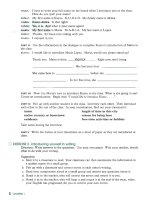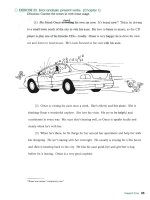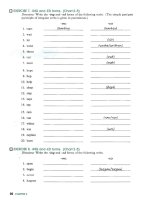Fundamentals of english grammar third edition part 45 pdf
Bạn đang xem bản rút gọn của tài liệu. Xem và tải ngay bản đầy đủ của tài liệu tại đây (418.49 KB, 7 trang )
EXERCISE
20.
Stative passive. (Chart
10-7)
Directims:
Complete the sentences with the words in
italics.
Use the passive form, simple
present, or simple past. Include prepositions where necessary.
1.
close
When we got to the post office, it
was
closed
.
2.
make
My earrings
ave We
&
gold.
3.
diworce
Sally and Tom used to be married, but now they
4.
relate
Your name is Tom Hood.
YOU
Mary Hood?
5.
sped
This fruit
.
I think I'd better throw it out.
6.
exhaust
Last
night
I
,
so
I
went straight to bed.
7.
involve
Last week I a three-car accident.
8.
locate
The University of Washiigton Seattle.
9.
drink
Ted
.
He's making a fool of himself.
10.
interest
I
learning more about that subject.
,,T-(
-"Ii
1
1.
dew$
Linda loves her job. She
her work.
12.
lose
What's the matter, little boy?
YOU
?
13.
tern&
Once when we were swimming at the beach, we saw a shark. All of us
14.
acquaint
YOU
Sue's roommate?
15.
qualt&
I didn't get the job. The interviewer said that
I
.
it.
16.
disappoint
My son brought home
a
report card with all D's and F's. I can't
understand it. I
him.
17.
do
At last,
I
my homework. Now I can go to bed.
.,~?Xi3
18.
crowd
There are too many students
in
our class. The classroom
296
CHAPTER
10
19.
shut It's starting to rain. all of the windows
Where's my wallet? It
!
Did you take it?
Indian
art
intmetn
me.
n
)
I
am
interested
in Indian
art.
~CORRECT:
I
am interesting in Indian art.
10-8
PARTICIPLAL ADJECTIVES:
-ED
VS.
-ING
(b)
Indian art is
inteksting.
INCORRECT:
Indian an
is
intererted.
The
news
surprised Kate.
(c) Kate was
arwed.
(d)
The news was
arrpridng.
(e)
Did
you hear the
mrprkng news?
(f)
Roberto fixed the
hken
window.
The
past pamciple (-ed)* and the present participle
(-ink) can be used as adjectives.
In (a): The past participle (interested) describes how
a
person feels.
In
(b):
The present participle (interestink) describes the
cause
of
the feeling. The cause of the interest is
Indian art.
In (c): surprised describes how Kate felt.
The past participle carries
a
passive meaning: Kate was
surprised
by
the news.
In
(d):
the news was the cause of the surprise.
Like
other adjectives, participial adjectives may follow
be,
as in examples (a) through (d), or come in front of nouns,
as in (e) and (f).
*The
past
pardciple
of regular verbs
ends
in
-ed
Some
verbs
have irregular forms. See Chart
2-6,
p.
32.
EXERCISE
21.
Participial adjectives. (Chart
10-8)
Directions:
Complete the sentences with the
-ed
or
-ing
form of the verbs in italics.
1.
Greg's classes interest him.
a. Greg's classes are
~htevestwi
"
b. Greg is
an
thtevested
smdent.
2.
Emily is going to Australia. The idea of going on this trip excites her.
a. Emily is about going on this trip.
b. She
thinks
it is going to be an trip.
3.
I
like to study sea life.
The
subject of marine biologyfascinares me.
a. I'm
by marine biology.
b. Marine biology is a
subject.
4.
Mike heard some bad news. The bad news depressed him.
a. Mike is very sad.
In
other words, he is
b. The news made Mike feel sad. The news was
5.
The exploration of space interests me.
a. I'm
in
the exploration of space.
b. The exploration of space is
to me.
6.
The nation's leader stole money. The scandal shocked the nation.
a. It was a scandal.
e
nation soon replaced the le-Am.
7.
I
bought a new camera. I read the directions twice, but I didn't understand them.
They conbed me.
a.
I
was when I aied to understand the directions.
.
hey
were directions.
8.
I spilled my
drink
on the dinner table. This ernbarrussedme.
a.
I
was very when I spilled
my
drink.
9.
Jane's classes bore her.
:
,I!
. .
,
'
. .
.
,
,
:
.
,.
a. Jane's classes are
>:,I
,
i
b. Jane is a
mdent.
,
,:,.
8.
.,
.:
,
~!,
,
~:,
.
,
,
10.
An
article in the newspaper surprised
Mrs.
Perez.
Ii
.
a.
It
was a very
article to her.
b.
Mrs.
Perez was very
when she read it.
!.!.*
1 1.
The loud noise frightened the children.
a. It was a sound.
b. The children
ran
into their house.
298
CHAPTER
10
EXERCISE
22.
Participial adjectives. (Chart
10-8)
J*IC
sDrecrions:
Complete the sentences
with
the appropriate
-ed
or
-ing
form of the words in
italics.
Julie was walking along the
edge
of the fountain outside her office building. She was with
-
her co-worker and friend Paul. Suddenly she lost her balance and accidentally
feN
in.
embarrass
2.
embarrass
.
,,,i.:
shock
r.
showk
5.
surprise
I.!-
I
,
6. surprise
7.
depress
9. interest
i,:
s
10
interest
Julie was really
Falling into the
Her friend Paul was
q,r,,
.,,
It was a sight.
,
.
.,
:
.:
.
The people around the office building were
very
~
~
when they saw Julie in the fountain.
:
'3.
,
,
.",i
It was a sight.
The next day Julie was
because she thought she
had made
a
fool of herself.
When she fell into the fountain, some people laughed at her. It was a
experience.
Her friend Paul told her not to lose her sense of humor. He told her it was
just another experience in life.
He said that people would be
in
hearing about
:.
how she fell into a fountain.
The
Passive
299
EXERCISE
23.
Participial adjectives. (Charts
10-7
and
10-8)
DimFMm:
Complete the sentences with an
-ed
or
-ing
adjective and the
boldface
noun.
1.
If
you
spoil
children,
they
become
spoileA
ckilAve~.
2.
If
a
door
rewolpws,
it is called a
VP\IO\V~W~
door,
3.
If
someone
steals
a
car,
it is a
4.
If
people
crowd
into
a
mom,
it
is
a
5.
If
costs
nie,
they
are
6.
If
a
danger
exists,
it is an
7.
If
you
dry
hit,
it becomes
8.
If
you
plan
an
event,
it is called a
9.
If
a
committee
plans
something,
it
is called a
10.
If
water
is
boiling,
we call it
11.
If
a
person
is
mirsing,
we call
him
or her a
-
12.
If
you
vegetables,
they
are
called
13.
If
the
weatherfreeses
things, it is called
14.
If
you
break
your
pencil,
you have a
0-9
GET
+
ADJECTIVE;
GET
+
PAST PARTICIPLE
GET
+
ADJECTNE
Get
can be followed by an adjective.
Get
gives the idea
(a)
1
am
getting
hungry.
Let's eat.
of change-rhe idea of becoming, beginning to be,
(b)
Eric
got
nervous
before the job interview.
mowing
to
be.
In
(a):
I'm
getting hungry.
=
I
wasn't hungry before, bur
MW
I'm
bem'nninz
to
be hmm.
GBT
+
PAST
PARIICIPLB
Sometimes
get
is followed by a past participle. The past
(c)
Ism
getting tirPd
L&
stop
working.
participle after
get
is like
an
adjective;
it
describes the
(dl
Steve
and
Rit.
pot
m'od
last month.
subject
of
the
sentence.
I
GET
+
ADJECllVH
get angry get dry
get bdd getfat
get
big
gel
w
get
busy
get hot
get close get hungry
get
cold get inmestud
get
dark get tars
Pdiny
get
nerww
ser
dw
get
old
get quiet
get rich
get se*MtlS
gcr
sick
get sleepy
gel
thirsty
get
well
get wt
GET
f
PAST
PARITCU'LE
get acquainted
get
drunk
get arrested get engaged
get bored
ger
excited
get
confused get finished
ger
crowded
get
frighnned
get
diwxed get hurt
get done get inmsted
get dwsed get invited
get involsd
get killed
get lost
get married
gst
scared
get sunburned
get tired
get
umrried
EXERCISE
24.
GET
+
adjectlve/past partlclple. (Chart
10-9)
Directions:
Complete the sentences. Use each word in the list only one time.
1.
In
winter, the weather gets
cold
2.
In
summer, the weather gets
3.
This food is delicious, but I can't eat any more. I'm getting
4.
1
think I'll go to bed. I'm getting
.I(
-
5.
Let's stop working and take a break. I'm getting
6.
Sam is wearing one brown sock and one blue sock today. He got
IK,+F,
-,
m
a hurry this morning and didn't pay attention to the color of his socks.
,,,
,
7.
This work has to be done before we leave. We'd better get
and
stop wasting time.
55v3
8.
1
didn't understand Jane's directions
very
well, so on the way to her house last night I
got
.
I couldn't find her house.
,.;y
,
,
9.
It's hard to work in a garage and stay clean. Paul's clothes always get
from all the grease and oil.
I??
10.
Don't waste your money gambling. You won't ever get
that way.
,>
.T!
1
.
i
!if
h'i
6.
11.
Mr.
Anderson is losing some of his hair. He's getting
12.
Was it a bad accident? Did anyone get
;*m
?
13.
Calm down! Take it easy! You shouldn't
1
m-j
get so
.
It's not
good for your blood pressure.
14.
When I turned around and around in a
The
Passive
501
15.
I
don't feel very good. I think I'm getting
. Maybe I should see
,
.
;;
;
:
'
i
.I
a doctor.
16. My friends got
at the party Saturday night, so I drove them
home in my car. They were in no condition to drive.
,
,
,?,'
EXERCISE
25.
GET
+
adjective/past partlclple. (Chart
10-9)
Directions:
Complete the sentences with appropriate forms of
get
and the words in the list.
thirsty
:
i
.
.
'
.II
.,-
Jsunburn
,
,,.
.!
,;.!!
'
1.
When I stayed out
in
the sun too long yesterday, I
96t
skhbknted
2.
If
you're sick, stay home and take care of yourself. You won't
if
you
don't take care of yourself.
;
3.
Jane and Greg are engaged. They are going to
a year
hm now.
-
4.
Sarah doesn't eat breakfast, so she always
by ten or
ten-thirty.
,.
. .
,
;
jrbin
5.
In
the winter, the sun
sets
early. It
.
earlier.
outside by six or even
6. Put these socks back
in
the dryer. They didn't
the
first time.
.
~
,
-
11
7.
Let's stop working for a while. I'm
.
I
need to rest.
mu
ir:.r/
8.
Sue has to vacate her apartment next week, and she hasn't found a new place to live.
She's
9.
Sitara always
after she eats salty food.
.
YI
:
,
,>.
5
.
,%
0.
Toshiro was
in
a temble car wreck and almost
.
He's lucky
t~
:
alive.
&i
.$p,++;
L.r
, ,
. .
,
"I
.
I
lll,l
I
I
Y
I
,,
\
W,!!?
,i
.
:!
1
r.
I
,
1
1. The temperature is dropping. Brrr! I'm
.
Can I
/
borrow your sweater?
.,.,
i.<d?q
12.
We were
in
a strange
city
without a map. It was easy for us to
We had to ask a shopkeeper how to get back to our hotel.
13. Did you
when your team won the game? Did you
clap and yell when they won?
302
CHAPTER
10









